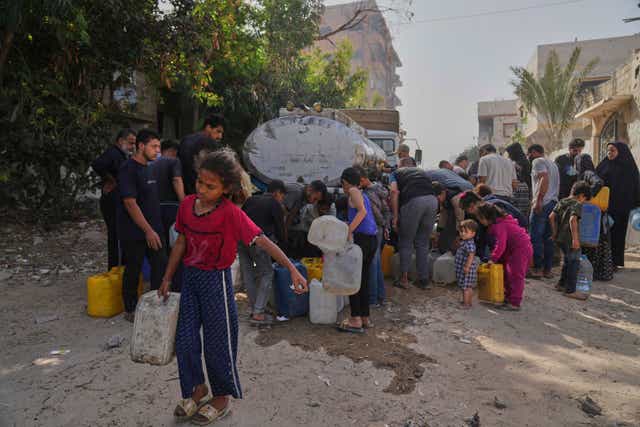Women and children among 13 killed in overnight Israeli strikes on Gaza
Local health officials said four children and their parents died in strikes on tents in the southern city of Khan Younis.

Israeli strikes have killed 13 people in the Gaza Strip, mostly women and children, according to local health officials.
Two of the strikes overnight and early on Sunday hit tents in the southern city of Khan Younis, each killing two children and their parents, while five other people were killed in strikes elsewhere.
The Israeli military says it only targets militants and tries to avoid harming civilians. It blames Hamas for civilian deaths in the 19-month war because the militants are embedded in densely populated areas.
There was no immediate Israeli comment on the latest strikes.
Israel has sealed Gaza off from all imports, including food, medicine and emergency shelter, for more than 10 weeks in what it says is a pressure tactic aimed at forcing Hamas to release hostages. Israel resumed its offensive in March, shattering a ceasefire that had facilitated the release of more than 30 hostages.
Aid groups say food supplies are running low and hunger is widespread in Gaza.

Children carrying empty bottles raced after a water tanker in a devastated area of northern Gaza on Sunday. Residents of the built-up Shati refugee camp said the water was brought by a charity from elsewhere in Gaza. Without it, they rely on wells that are salty and often polluted.
“I am forced to drink salty water, I have no choice,” said Mahmoud Radwan. “This causes intestinal disease, and there’s no medicine to treat it.”
Cogat, the Israeli military body in charge of Palestinian civilian affairs, says enough aid entered during a two-month ceasefire this year and that two of the three main water lines from Israel are still functioning. Aid groups say the humanitarian crisis is now worse than at any time in the war.
US President Donald Trump, whose administration has voiced full support for Israel’s actions, is set to visit Saudi Arabia, Qatar and the United Arab Emirates this week in a regional tour that will not include Israel.
The war began when Hamas-led militants attacked southern Israel on October 7, 2023, killing some 1,200 people, mostly civilians, and taking 251 hostage. Fifty-nine hostages are still inside Gaza, around a third of them believed to be alive, after most of the rest were released in ceasefire agreements or other deals.
Israel’s offensive has killed more than 52,000 Palestinians, mostly women and children, according to Gaza’s Health Ministry, which does not say how many of the dead were combatants or civilians. The offensive has destroyed vast areas of the territory and displaced some 90% of its population of around two million.





